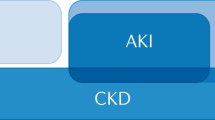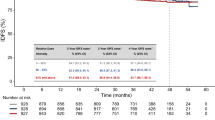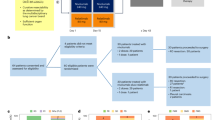Abstract
Carcinoma of the bladder is a common, chemosensitive malignancy. The value of chemotherapy for transitional cell carcinoma (the commonest malignant bladder histology in the developed world) has been demonstrated in both the palliative and the neoadjuvant settings, with survival benefits in both scenarios being achieved with cisplatin-based regimens. Conventional drug treatment is, therefore, dependent on adequate renal function, but renal impairment is a common confounding factor in patients with bladder cancer, due in part to obstruction of the urinary tract and in part to comorbidity in an elderly population. A recent consensus statement deems patients with impaired renal function unsuitable for cisplatin treatment, but the limited available evidence does not support the exclusion of cisplatin in patients with moderate renal impairment. The literature on which to base alternative, non-cisplatin-based chemotherapy is inadequate, but the perception that carboplatin-based combinations are inferior to cisplatin-based combinations is probably incorrect. Trials are needed to specifically examine chemotherapy in patients with bladder cancer and renal impairment.
This is a preview of subscription content, access via your institution
Access options
Subscribe to this journal
Receive 12 print issues and online access
$209.00 per year
only $17.42 per issue
Buy this article
- Purchase on Springer Link
- Instant access to full article PDF
Prices may be subject to local taxes which are calculated during checkout
Similar content being viewed by others
References
Bladder cancer—UK incidence statistics. Cancer Research UK [online], (2011).
Dash, A. et al. Impact of renal impairment on eligibility for adjuvant cisplatin-based chemotherapy in patients with urothelial carcinoma of the bladder. Cancer 107, 506–513 (2006).
National Kidney Foundation. K/DOQI clinical practice guidelines for chronic kidney disease: evaluation, classification, and stratification. Am. J. Kidney Dis. 39, S1–S266 (2002).
Galsky, M. D. et al. A consensus definition of patients with metastatic urothelial carcinoma who are unfit for cisplatin-based chemotherapy. Lancet Oncol. 12, 211–214 (2011).
Raj, G. V., Iasonos, A., Herr, H. & Donat, S. M. Formulas calculating creatinine clearance are inadequate for determining eligibility for Cisplatin-based chemotherapy in bladder cancer. J. Clin. Oncol. 24, 3095–3100 (2006).
Merrin, C. Treatment of advanced bladder cancer with cis-diamminedichloroplatinum (II NSC 119875): a pilot study. J. Urol. 119, 493–495 (1978).
Soloway, M. S. Cis-diamminedichloroplatinum II in advanced urothelial cancer. J. Urol. 120, 716–719 (1978).
Prestayko, A. W., Luft, F. C., Einhorn, L. & Crooke, S. T. Cisplatin pharmacokinetics in a patient with renal dysfunction. Med. Pediatr. Oncol. 5, 183–188 (1978).
Ribrag, V. et al. Test dose-guided administration of cisplatin in an anephric patient: a case report. Ann. Oncol. 4, 679–682 (1993).
Haim, N. et al. Estimation of creatinine clearance without 24-hour urine collection—a useful guide during cisplatin therapy. Acta Oncol. 32, 409–412 (1993).
Mead, G. M. et al. A randomized trial comparing methotrexate and vinblastine (MV) with cisplatin, methotrexate and vinblastine (CMV) in advanced transitional cell carcinoma: results and a report on prognostic factors in a Medical Research Council study. MRC Advanced Bladder Cancer Working Party. Br. J. Cancer 78, 1067–1075 (1998).
von der Maase, H. et al. Gemcitabine and cisplatin versus methotrexate, vinblastine, doxorubicin, and cisplatin in advanced or metastatic bladder cancer: results of a large, randomized, multinational, multicenter, phase III study. J. Clin. Oncol. 17, 3068–3077 (2000).
Carles, J. et al. Feasiblity study of gemcitabine and cisplatin administered every two weeks in patients with advanced urothelial tumors and impaired renal function. Clin. Transl. Oncol. 8, 755–757 (2006).
Hussain, S. A. et al. A phase I/II study of gemcitabine and fractionated cisplatin in an outpatient setting using a 21-day schedule in patients with advanced and metastatic bladder cancer. Br. J. Cancer 91, 844–849 (2004).
Petrioli, R. et al. Comparison between a cisplatin-containing regimen and a carboplatin-containing regimen for recurrent or metastatic bladder cancer patients: A randomized phase II study. Cancer 77, 344–351 (1996).
Bellmunt, J. et al. Carboplatin-based versus cisplatin-based chemotherapy in the treatment of surgically incurable advanced bladder carcinoma. Cancer 80, 1966–1972 (1997).
Bellmunt, J., de Wit, R., Albanell, J. & Baselga, J. A feasibility study of carboplatin with fixed dose of gemcitabine in “unfit” patients with advanced bladder cancer. Eur. J. Cancer 37, 2212–2215 (2001).
Carles, J. et al. Carboplatin-gemcitabine treatment of patients with transitional cell carcinoma of the bladder and impaired renal function. Oncology 59, 24–27 (2000).
Linardou, H. et al. Gemcitabine and carboplatin combination as first-line treatment in elderly patients and those unfit for cisplatin-based chemotherapy with advanced bladder carcinoma: Phase II study of the Hellenic Co-operative Oncology Group. Urology 64, 479–484 (2004).
Nogué-Aliguer, M. et al. Gemcitabine and carboplatin in advanced transitional cell carcinoma of the urinary tract. Cancer 97, 2180–2186 (2003).
Shannon, C. et al. Carboplatin and gemcitabine in metastatic transitional cell carcinoma of the urothelium: effective treatment of patients with poor prognostic features. Ann. Oncol. 12, 947–952 (2001).
De Santis, M. et al. Randomized phase II/III trial assessing gemcitabine/carboplatin and methotrexate/carboplatin/vinblastine in patients with advanced urothelial cancer “unfit” for cisplatin-based chemotherapy: phase II—results of EORTC study 30986. J. Clin. Oncol. 27, 5634–5639 (2009).
Dogliotti, L. et al. Gemcitabine plus cisplatin versus gemcitabine plus carboplatin as first-line chemotherapy in advanced transitional cell carcinoma of the urothelium: results of a randomized phase 2 trial. Eur. Urol. 52, 134–141 (2007).
Galsky, M. D. et al. Comparative effectiveness of cisplatin-based and carboplatin-based chemotherapy for treatment of advanced urothelial carcinoma. Ann. Oncol. http://dx.doi.org/10.1093/annonc/mdr156
Dreicer, R. et al. Phase III trial of methotrexate, vinblastine, doxorubicin, and cisplatin versus carboplatin and paclitaxel in patients with advanced carcinoma of the urothelium. Cancer 100, 1639–1645 (2004).
Calvert, A. H. & Egorin, M. J. Carboplatin dosing formulae: gender bias and the use of creatinine-based methodologies. Eur. J. Cancer 38, 11–16 (2002).
Roth, B. et al. Significant activity of paclitaxel in advanced transitional-cell carcinoma of the urothelium: a phase II trial of the Eastern Cooperative Oncology Group. J. Clin. Oncol. 12, 2264–2270 (1994).
Dimopoulos, M. A. et al. Treatment of patients with metastatic urothelial carcinoma and impaired renal function with single-agent docetaxel. Urology 52, 56–60 (1998).
Vaughn, D. J. et al. Paclitaxel plus carboplatin in advanced carcinoma of the urothelium: an active and tolerable outpatient regimen. J. Clin. Oncol. 16, 255–260 (1998).
Friedland, D. M., Dakhil, S., Hollen, C., Gregurich, M. A. & Asmar, L. A phase II evaluation of weekly paclitaxel plus carboplatin in advanced urothelial cancer. Cancer Invest. 22, 374–382 (2004).
Johannsen, M. et al. Phase II trial of weekly paclitaxel and carboplatin chemotherapy in patients with advanced transitional cell cancer. Eur. Urol. 48, 246–251 (2005).
Kouno, T. et al. Weekly paclitaxel and carboplatin against advanced transitional cell cancer after failure of a platinum-based regimen. Eur. Urol. 52, 1115–1122 (2007).
Fechner, G. et al. Randomised phase II trial of gemcitabine and paclitaxel second-line chemotherapy in patients with transitional cell carcinoma (AUO Trial AB 20/99). Int. J. Clin. Pract. 60, 27–31 (2006).
Matsumoto, K. et al. Gemcitabine and paclitaxel chemotherapy as a second-line treatment for advanced or metastatic urothelial carcinoma. Int. J. Urol. 14, 1000–1004 (2007).
Suyama, T. et al. Combination of gemcitabine and paclitaxel as second-line chemotherapy for advanced urothelial carcinoma. Jpn J. Clin. Oncol. 39, 244–250 (2009).
Hussain, M., Vaishampayan, U., Du, W., Redman, B. & Smith, D. C. Combination paclitaxel, carboplatin, and gemcitabine is an active treatment for advanced urothelial cancer. J. Clin. Oncol. 19, 2527–2533 (2001).
Pectasides, D. et al. Weekly chemotherapy with docetaxel, gemcitabine and cisplatin in advanced transitional cell urothelial cancer: a phase II trial. Ann. Oncol. 13, 243–250 (2002).
Galsky, M. D. et al. Phase II trial of dose-dense doxorubicin plus gemcitabine followed by paclitaxel plus carboplatin in patients with advanced urothelial carcinoma and impaired renal function. Cancer 109, 549–555 (2007).
Advanced Bladder Cancer (ABC) Meta-analysis Collaboration. Neoadjuvant chemotherapy in invasive bladder cancer: update of a systematic review and meta-analysis of individual patient data advanced bladder cancer (ABC) meta-analysis collaboration. Eur. Urol. 48, 202–205 (2005).
Winquist, E. et al. Neoadjuvant chemotherapy for transitional cell carcinoma of the bladder: a systematic review and meta-analysis. J. Urol. 171, 561–569 (2004).
Advanced Bladder Cancer (ABC) Meta-analysis Collaboration. Adjuvant chemotherapy in invasive bladder cancer: a systematic review and meta-analysis of individual patient data Advanced Bladder Cancer (ABC) Meta-analysis Collaboration. Eur. Urol. 48, 189–199 (2005).
Ghoneim, M. A., el-Mekresh, M. M., el-Baz, M. A., el-Attar, I. A. & Ashamallah, A. Radical cystectomy for carcinoma of the bladder: critical evaluation of the results in 1,026 cases. J. Urol. 158, 393–399 (1997).
Galsky, M. D. et al. Prospective trial of ifosfamide, paclitaxel, and cisplatin in patients with advanced non-transitional cell carcinoma of the urothelial tract. Urology 69, 255–259 (2007).
Swanson, D. A., Liles, A. & Zagars, G. K. Preoperative irradiation and radical cystectomy for stages T2 and T3 squamous cell carcinoma of the bladder. J. Urol. 143, 37–40 (1990).
Serretta, V., Pomara, G., Piazza, F. & Gange, E. Pure squamous cell carcinoma of the bladder in western countries. Report on 19 consecutive cases. Eur. Urol. 37, 85–89 (2000).
Richie, J. P., Waisman, J., Skinner, D. G. & Dretler, S. P. Squamous carcinoma of the bladder: treatment by radical cystectomy. J. Urol. 115, 670–672 (1976).
Rundle, J. S. et al. Squamous cell carcinoma of bladder. A review of 114 patients. Br. J. Urol. 54, 522–526 (1982).
Choong, N., Quevedo, J. & Kaur, J. Small cell carcinoma of the urinary bladder. Cancer 103, 1172–1178 (2005).
Kaya, A. O. et al. Primary pure small cell carcinoma of the urinary bladder that responded to carboplatin plus etoposide: a case report and review of the literature. J. BUON 14, 703–706 (2009).
Bex, A. et al. Small cell carcinoma of bladder: a single-center prospective study of 25 cases treated in analogy to small cell lung cancer. Urology 65, 295–299 (2005).
Mukesh, M., Cook, N., Hollingdale, A. E., Ainsworth, N. L. & Russell, S. G. Small cell carcinoma of the urinary bladder: a 15-year retrospective review of treatment and survival in the Anglian Cancer Network. BJU Int. 103, 747–752 (2009).
Tran, B. & McKendrick, J. Metastatic urachal cancer responding to FOLFOX chemotherapy. Can. J. Urol. 17, 5120–5123 (2010).
Mohile, S. G., Schleicher, L. & Petrylak, D. P. Treatment of metastatic urachal carcinoma in an elderly woman. Nat. Clin. Pract. Oncol. 5, 55–58 (2008).
Logothetis, C. J., Samuels, M. L. & Ogden, S. Chemotherapy for adenocarcinomas of bladder and urachal origin: 5-fluorouracil, doxorubicin, and mitomycin-C. Urology 26, 252–255 (1985).
Author information
Authors and Affiliations
Ethics declarations
Competing interests
The author declares no competing financial interests.
Rights and permissions
About this article
Cite this article
Nicholson, S. Chemotherapy for bladder cancer in patients with impaired renal function. Nat Rev Urol 9, 52–57 (2012). https://doi.org/10.1038/nrurol.2011.176
Published:
Issue Date:
DOI: https://doi.org/10.1038/nrurol.2011.176
This article is cited by
-
Quality-of-life evaluation during platinum-based neoadjuvant chemotherapies for urothelial carcinoma
International Journal of Clinical Oncology (2017)



